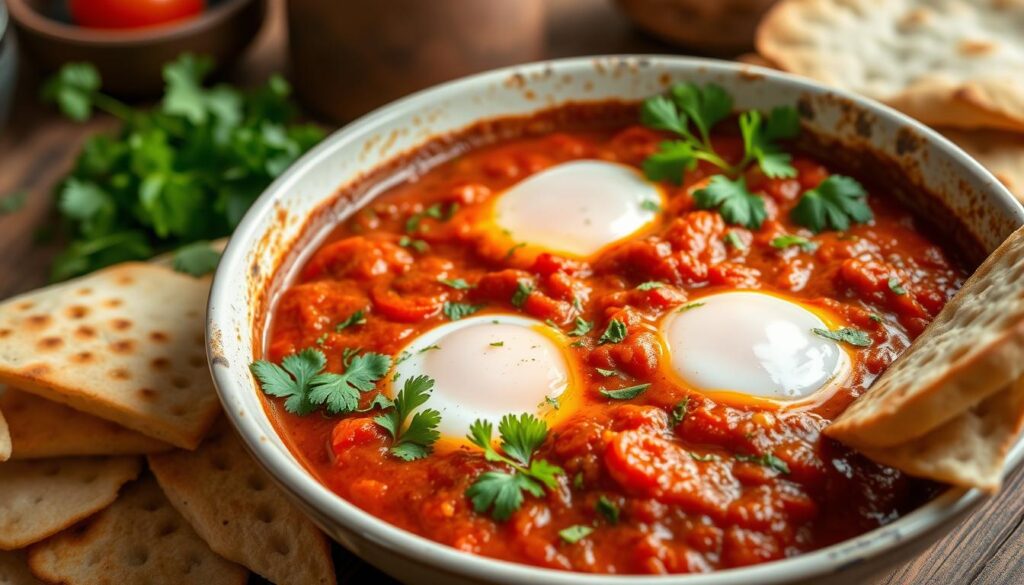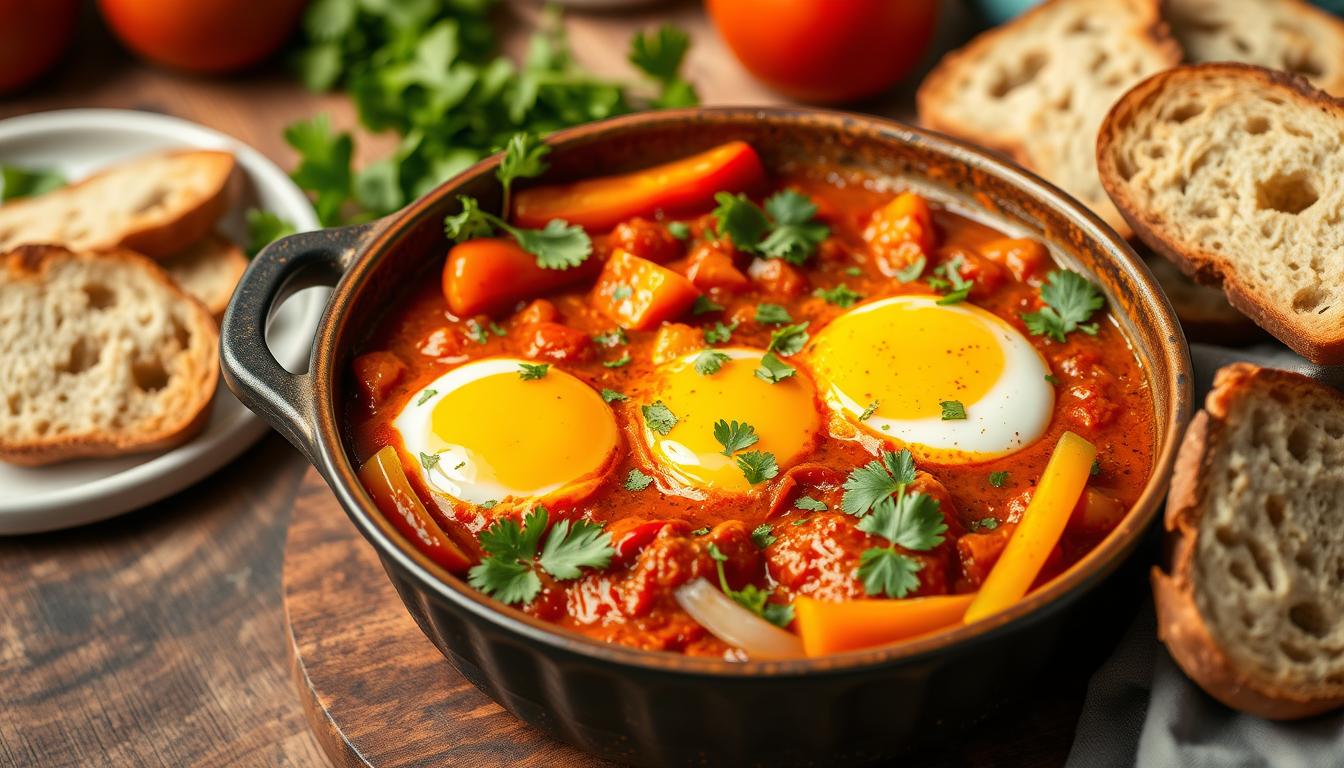When the smell of tomatoes and spices wafts through the air, you feel like you’re in the Middle East. Shakshuka, a dish loved by many, is more than food. It’s a celebration of culture and the joy of simple ingredients.
I grew up loving home cooking. The sound of the pan and the sauce simmering would draw me into the kitchen. Seeing eggs in a rich tomato sauce was amazing. The first bite was like a flavor explosion.
Shakshuka has become a favorite dish worldwide. It shows the strength of shared cooking traditions. From North Africa to the Middle East, it’s a mix of flavors that feeds both body and soul.
Table of Contents
Origins and Cultural Heritage of Shakshuka
Shakshuka is a beloved breakfast dish with deep roots in North Africa and the Middle East. It started in Tunisia and was influenced by the Ottoman Empire’s “Şakşuka” dish. The addition of tomatoes and eggs was influenced by Andalusian Muslims and Jewish exiles from Spain.
North African Roots and Evolution
The name “shakshuka” comes from the Amazigh language, meaning “all mixed up.” This shows the vibrant mix of ingredients in the dish. Shakshuka is deeply connected to the Amazigh people, showing the rich cultural heritage of this Middle Eastern cuisine staple.
Middle Eastern Influence
Jewish migration spread shakshuka to Italy, Spain, and the Middle East. It evolved, taking on regional flavors. In Israel, it became a beloved part of the diverse culinary scene, with each community adding its own twist.
Global Culinary Impact
Today, shakshuka is loved worldwide. It’s found in Middle Eastern cuisine restaurants and trendy brunch spots. Its North African and Middle Eastern roots have made it a global sensation.
| Ingredient | Percentage |
|---|---|
| Tomatoes | 55% |
| Jalapeño Peppers | 11% |
| Red Bell Peppers | 11% |
| Ground Cumin | 2% |
| Smoked Paprika | 1% |
| Cayenne Pepper | 0.5% |
| Water | 3% |
| Olive Oil | 3% |
| Eggs | 4-5 per serving |
The table shows the main ingredients and their amounts in a traditional spicy pepper medley Shakshuka recipe. It highlights the balanced flavors that make this Middle Eastern cuisine dish so unique and tasty.

“Shakshuka is a beautiful mosaic of flavors, reflecting the rich cultural heritage of North Africa and the Middle East. It’s a dish that truly captures the essence of the region’s vibrant culinary traditions.”
Essential Ingredients for an Authentic Mediterranean Experience
Making the perfect shakshuka, a favorite Mediterranean dish, needs a mix of key ingredients. These ingredients bring the region’s lively flavors to life. At the core is canned diced tomatoes, the base of the dish’s tomato sauce.
Other key parts include aromatic onions, colorful bell peppers, and fragrant garlic. Together, they make a rich, flavorful sauce that’s the heart of the dish.
The magic happens when eggs are poached in the sauce. Their runny yolks and soft whites mix well with the tangy tomatoes. This mix of textures and tastes is what makes Mediterranean food special.
Adding warm spices like paprika, cumin, and chili powder deepens the sauce’s flavor. Fresh herbs, like parsley or cilantro, add a bright, fresh taste that balances the dish’s richness.
For a richer taste, crumbled feta cheese or creamy goat cheese can be added. And no Mediterranean dish is complete without a drizzle of olive oil. It adds a smooth feel and boosts the flavors.
By choosing and mixing these key ingredients, you can bring the true Mediterranean taste to your table. It’s like taking a trip to the sunny shores and lively markets that have inspired this dish for so long.

The Art of Creating the Perfect Tomato Base
At the heart of a mouthwatering shakshuka lies the carefully crafted tomato base. This vibrant, flavorful sauce is the foundation. It brings together the spicy pepper medley and herby aroma in perfect harmony. This takes you to the rich culinary traditions of the Middle East.
Selecting Premium Tomatoes
The secret to an exceptional tomato base begins with choosing the right tomatoes. Opt for juicy, ripe Roma or San Marzano tomatoes. They offer a balance of sweetness and acidity. Carefully peel and crush the tomatoes by hand, preserving their chunky texture and natural flavors.
Balancing Spices and Aromatics
Next, sauté diced onions, bell peppers, and minced garlic in a generous pour of olive oil. Add a medley of warm spices like paprika, cumin, and chili powder. This infuses the base with a robust, earthy aroma. The key is to strike a delicate balance between the spice’s warmth and the tomatoes’ natural acidity, creating a harmonious flavor profile.
Achieving Ideal Sauce Consistency
Simmer the tomato mixture for 8-10 minutes. This allows the flavors to meld and the sauce to thicken to a velvety, pourable consistency. Adjust the seasoning as needed, ensuring the perfect balance of sweetness, tanginess, and heat. The result should be a sauce that coats the eggs and vegetables in a rich, comforting embrace.
By mastering the art of creating the perfect tomato base, you’ll unlock the true essence of shakshuka. This dish celebrates the vibrant, herby aroma and spicy pepper medley. These are the hallmarks of Middle Eastern cuisine.
Mastering the Egg Poaching Technique
Poaching eggs in tomato sauce is a true art. To get tender whites and runny yolks, you need to learn a few tricks. Start by making small wells in the sauce with a spoon. Then, gently crack eggs into these spots without breaking them.
Cover the pan with a lid and let the eggs cook for 5-8 minutes for a runny yolk. For a firmer yolk, cook for 10-15 minutes. The lid keeps the steam in, cooking the eggs evenly and quickly. Watch the temperature closely to avoid overcooking the eggs.
Getting the eggs right in this one-pan wonder takes practice. But with time, you’ll get it just right. You’ll enjoy soft, runny yolks and firm, silky whites together.
“The art of poaching eggs in a flavorful sauce is a true testament to the culinary traditions of the Mediterranean region.”
Shakshuka: A Warm Embrace of Mediterranean Flavors
Shakshuka is a famous Israeli breakfast dish loved around the world. It’s a vegetarian delight that combines the rich tastes of the Mediterranean. It’s a comforting way to start your day.
Traditional Preparation Methods
To make shakshuka, you start with a flavorful tomato base. It’s simmered with onions, bell peppers, and spices. Then, fresh eggs are poached in the sauce, blending with the tomato mix.
Regional Variations
- Tunisian shakshuka has a spicier tomato sauce, often with harissa paste for a kick.
- In Egypt, shakshuka is different, with scrambled eggs mixed into the tomato base, making a filling egg sandwich.
Modern Interpretations
Modern chefs keep the dish’s essence but add their twist. They might add zucchini or eggplant for texture. Or, they might include meats like chorizo or lamb for more flavor. Shakshuka’s versatility lets chefs explore new flavors while keeping its Mediterranean heart.
“Shakshuka is a testament to the power of simplicity. With just a few humble ingredients, you can create a dish that embodies the warmth and vibrancy of the Mediterranean region.”
| Ingredient | Quantity | Health Benefits |
|---|---|---|
| Tomatoes | 6 medium | Rich in antioxidants and vitamin C |
| Eggs | 6 large | High in protein and nutrients |
| Onions | 2 medium | Contain quercetin, a powerful antioxidant |
| Bell Peppers | 2 medium | Excellent source of vitamin C and fiber |
Kitchen Equipment and Cookware Essentials
To make a real one-pan wonder like shakshuka, you need the right tools. For this tasty cast iron skillet meal, you’ll need:
- A 12-inch or larger sauté pan or cast iron skillet
- A sharp chef’s knife for chopping vegetables
- A can opener to easily access canned tomatoes
- A spatula or slotted spoon for gently handling the eggs
Some extra items can make cooking better. You might want a lid for the skillet, a spice grinder, or a zester for lemon zest.
Choose a stainless steel pan to avoid metallic tastes from acidic tomatoes. This way, your one-pan wonder will taste just right, with true Mediterranean flavors.
“Investing in the right cookware is key to unlocking the full potential of your shakshuka. The cast iron skillet is a true workhorse, delivering even heat distribution and a beautifully seared finish.”
With these tools, you’re ready to make amazing shakshuka. You’ll create a delicious cast iron skillet meal that feels like a trip to the Mediterranean.
Serving Suggestions and Accompaniments
Shakshuka, a favorite in the Mediterranean, is best served from the skillet. It comes with warm, crusty bread for dipping. This herby aroma and feta cheese garnish dish lets you enjoy every flavorful tomato-based sauce drop.
Traditional Bread Pairings
The best match for shakshuka is soft pita or tangy sourdough. These breads are perfect for soaking up the savory sauce. For gluten-free, try it with crispy falafel or roasted veggies.
Modern Side Dishes
- Creamy hummus
- Vibrant tabbouleh salad
- Roasted eggplant or zucchini
- Crispy roasted chickpeas
Garnishing Tips
Enhance your shakshuka with fresh garnishes. Add chopped parsley, cilantro, or dill for a herby aroma. Top it with feta cheese or goat cheese. Finish with olive oil, paprika, or red pepper flakes for color and heat.
Pairing shakshuka with the right sides makes it a memorable brunch favorite. It celebrates the Mediterranean’s vibrant flavors.
Storage and Make-Ahead Tips
Shakshuka is a favorite for brunch and can be made ahead of time. This saves you time on busy mornings. The tomato base can be made up to 3 days before and kept in the fridge. Just reheat it and add fresh eggs for a tasty dish.
Preparing the base ahead lets you enjoy shakshuka’s Mediterranean flavors easily. It’s perfect for a weekend brunch or a quick weekday breakfast. Your family and friends will love it.
For the best results, warm the tomato base before adding eggs. This helps the eggs cook perfectly, adding to the dish’s creamy texture. A bit of planning makes a delicious shakshuka ready in no time.
“Shakshuka is the ultimate one-pan wonder – a flavorful, comforting dish that can be prepared quickly and easily, even on the busiest of mornings.”
Next time you want Mediterranean flavors, plan ahead. Make the tomato base and enjoy a great shakshuka. It’s perfect for brunch or a weekday boost.
Conclusion
Shakshuka has become a favorite dish around the world. It’s known for its vibrant Mediterranean flavors. This dish, from North Africa and the Middle East, is loved for its taste and health benefits.
It’s perfect for breakfast, brunch, or dinner. Shakshuka’s simple yet exciting preparation has won hearts. Its many variations have made it a favorite among vegetarians and brunch lovers.
Shakshuka is more than just a dish; it’s a culinary treasure. It combines poached eggs with a rich tomato sauce and spices. This mix of flavors and textures makes every meal special.
Exploring Shakshuka can be a fun adventure. Try new ingredients and regional twists. Making Shakshuka at home lets you enjoy its flavors and health benefits.
With a little creativity, you can bring North Africa and the Middle East to your table. Enjoy a meal that’s both nourishing and delicious.
